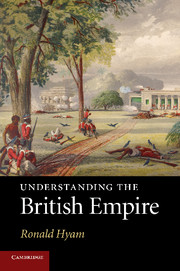Book contents
- Frontmatter
- Contents
- List of plates
- List of figures
- List of maps
- List of tables
- Preface
- Acknowledgements
- List of abbreviations
- Introduction: perspectives, policies, and people
- I Dynamics: geopolitics and economics
- 1 The primacy of geopolitics: the dynamics of British imperial policy, 1763–1963
- 2 The partition of Africa: geopolitical and internal perspectives
- 3 The empire in a comparative global context, 1815–1914
- 4 The myth of ‘gentlemanly capitalism’
- II Ethics and religion
- III Bureaucracy and policy-making
- IV Great men
- V Sexuality
- VI Imperial historians
- Published writings of RH on imperial history
- Index
1 - The primacy of geopolitics: the dynamics of British imperial policy, 1763–1963
Published online by Cambridge University Press: 05 August 2012
- Frontmatter
- Contents
- List of plates
- List of figures
- List of maps
- List of tables
- Preface
- Acknowledgements
- List of abbreviations
- Introduction: perspectives, policies, and people
- I Dynamics: geopolitics and economics
- 1 The primacy of geopolitics: the dynamics of British imperial policy, 1763–1963
- 2 The partition of Africa: geopolitical and internal perspectives
- 3 The empire in a comparative global context, 1815–1914
- 4 The myth of ‘gentlemanly capitalism’
- II Ethics and religion
- III Bureaucracy and policy-making
- IV Great men
- V Sexuality
- VI Imperial historians
- Published writings of RH on imperial history
- Index
Summary
[Reprinted from the Festschrift for Professor Roger Louis, The statecraft of British imperialism: essays in honour of Wm. Roger Louis (ed. R.D. King and R. Kilson, 1999), appearing first in the Journal of Imperial and Commonwealth History, vol. 27 (1999). The formulation of my ideas on this subject particularly benefited from discussions with Professor Sir Christopher Bayly and Dr T.N. Harper. As yet, the most systematic attempt to apply the ‘interaction’ model suggested here has been Peter Henshaw's account of the origins of the South Africa War: ‘Breakdown: into war, 1895–1899’, in our joint book The lion and the springbok: Britain and South Africa since the Boer War (Cambridge, 2003), pp. 37–56.]
When in the early 1960s Roger Louis began writing on the history of the British empire, the dominant historiographical fashion was to invoke economic interpretations, even to subscribe to economic determinism. Hobson, Lenin, and the ‘export of surplus capital’ threw a long and intimidating shadow over the subject. Capitalism and slavery by Eric Williams was a key text, ‘Economic factors in the history of the empire’ by Richard Pares an essential article. Vincent Harlow's monumental The founding of the Second British Empire, 1763–1793 argued that a preference for ‘trade rather than dominion’ was the general characteristic from the late eighteenth century. Keith Hancock's great work, the Survey of British Commonwealth affairs, was built around the organising concept of moving frontiers of migration, money, and markets.
- Type
- Chapter
- Information
- Understanding the British Empire , pp. 71 - 97Publisher: Cambridge University PressPrint publication year: 2010



